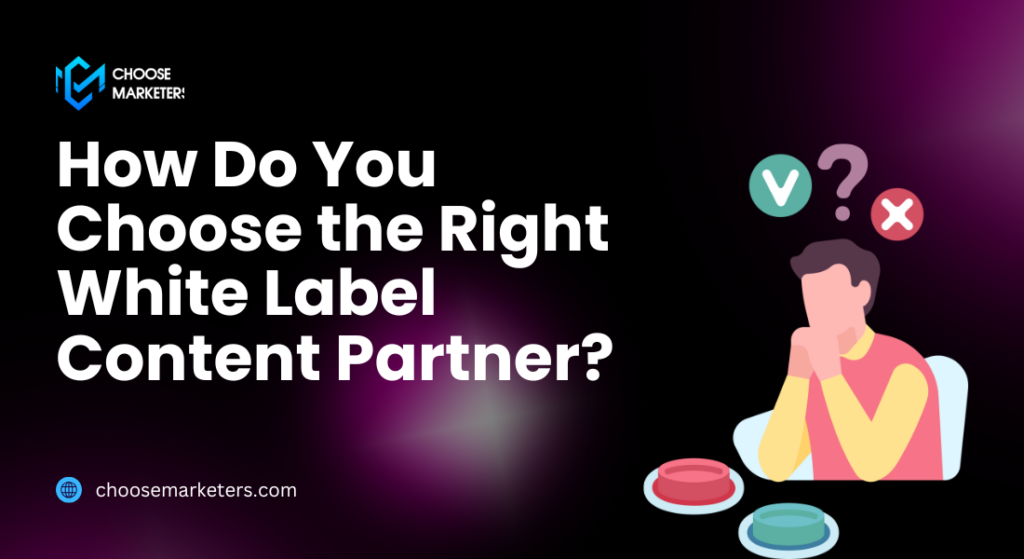

8 Proven Strategies to Boost Your Business with White Label Content Marketing
What is White Label Content Marketing?
White label content marketing is an innovative solution that allows businesses to provide high-quality content without creating it in-house. Instead, a specialized third-party agency (the white label partner) produces the content, which the original business then brands as its own. As a result, this approach has become a powerful strategy for B2B companies, particularly in the USA. Not only does it help them scale their marketing efforts efficiently, but it also ensures content consistency and quality.
Why Choose White Label Content Marketing?
White label content marketing is particularly attractive for B2B agencies in the USA. These agencies want to offer diverse services without extensive overhead. By partnering with a white label provider, they can expand their offerings. This includes specialized services like SEO, blog writing, social media management, and content marketing.
In digital economy, white label content marketing offers a unique solution. It combines cost-efficiency, scalability, and quality. This makes it an ideal strategy for businesses aiming to enhance their content marketing efforts. It helps meet SEO goals and scale their brand’s impact effectively.
What Are the Benefits of White Label Content Marketing?
White label content marketing offers several significant advantages for businesses. It allows agencies to expand their digital marketing capabilities without the need for an in-house team. White label content offers a cost-effective solution for B2B agencies in the USA looking to enhance their services. It also provides flexibility, allowing agencies to expand their offerings without additional overhead. This approach is becoming increasingly popular as it helps drive revenue growth and streamline operations. Here’s an in-depth look at the main benefits of white label content marketing.
Scalability and Flexibility
One of the top benefits of white label content marketing is the scalability it provides. This model allows businesses to adjust the volume of content they produce. This flexibility helps them respond to seasonal demand changes or special marketing campaigns. With a white label partner, businesses can increase or decrease content production without hiring or training new staff. This flexibility enables businesses to stay agile and responsive. They can support large-scale projects on short notice without compromising quality.
Cost-Effectiveness and Resource Efficiency
Cost savings are a driving factor for many companies that choose white label content solutions. Outsourcing content creation to a specialized agency helps businesses save on recruitment, onboarding, and training costs. White label agencies often employ seasoned professionals skilled in SEO and digital marketing. As a result, companies receive high-quality, optimized content at a fraction of the cost. This is especially beneficial for small and medium-sized businesses (SMBs) aiming to compete with larger enterprises on a tight budget.
Enhanced Expertise and High-Quality Content
White label content providers typically bring specialised expertise in areas such as SEO, content strategy, social media, and link building. These agencies stay updated on industry trends and algorithm changes. This ensures they craft content optimized for search engines. With access to industry expertise, businesses can offer sophisticated content services. This elevates brand reputation and meets client needs with high-quality, data-driven content.
SEO Benefits and Improved Online Visibility
Search engine optimization (SEO) is vital for businesses aiming to boost their online presence. White label content providers prioritize SEO by using targeted keywords in their content. They structure it for readability and ensure it aligns with search engine best practices. By leveraging SEO expertise, white label agencies help businesses achieve higher rankings, which drives more traffic and increases brand visibility. Effective SEO-optimised content can also improve user engagement metrics, further enhancing search engine rankings and attracting new leads.
Consistency in Brand Messaging and Voice
Maintaining a consistent brand voice is essential for brand credibility, especially in the highly competitive B2B space. White label agencies can seamlessly integrate into a company’s brand guidelines. They create content that reflects the desired tone, messaging, and aesthetic.Consistent brand messaging builds trust with audiences. It also helps companies reinforce their brand identity across all digital touchpoints. White label providers ensure the content aligns with the brand’s values. This helps create a cohesive customer experience and strengthens brand loyalty.
How Does White Label Content Marketing Work?
White label content Marketing works through a collaborative model. A business partners with a third-party agency to produce branded content. This approach allows businesses to provide high-quality, SEO-optimized content for their clients or internal needs without in-house production. Understanding how white label content marketing works is crucial for companies. It helps streamline content creation, enhance brand authority, and scale marketing operations effectively.
Selecting a White Label Content Partner
The process begins with choosing a reliable white label content agency. This agency should align with the brand’s goals, voice, and industry needs. The agency’s expertise in SEO, content strategy, and social media marketing directly impacts the quality and effectiveness of the content. Companies prefer partners with a proven track record and transparent processes. Expertise in content types like blog posts, social media, or technical articles is also important.
Defining Content Goals and Requirements
Once a partner is selected, the next step is for the business to clearly define content goals and objectives. This involves specifying the type of content needed, such as SEO-focused articles, thought leadership blogs, or social media posts. The business also shares details about the target audience, relevant SEO keywords, brand guidelines, and tone of voice. This ensures the content aligns with the company’s brand identity. This clarity helps the white label agency produce high-quality, tailored content that fits seamlessly into the brand’s overall marketing strategy.
Content Creation and Customization
After understanding the requirements, the white label agency begins content creation. Professional writers and SEO specialists at the agency craft content that meets the specific needs outlined by the business. They incorporate target keywords and SEO best practices to help the content rank well on search engines. This improves visibility and drives organic traffic. White label agencies use advanced tools like AI-driven analytics to identify trending topics and audience preferences. This enables them to create more personalized, data-driven content.
Customization is a crucial part of this process. The agency ensures the content reflects the brand accurately by following the brand’s guidelines. It adjusts the language, tone, and messaging to match the client’s identity. This ensures that, despite being outsourced, the content feels authentic and resonates with the target audience.
Review and Approval Process
Once the content is created, the business reviews the drafts provided by the white label agency. Feedback or revisions are incorporated to ensure the final product meets standards and aligns with marketing goals. This collaborative approach maintains content quality and ensures the brand’s message is conveyed accurately. Effective communication and a streamlined review process ensure prompt and efficient content delivery.
Performance Tracking and Optimization
Finally, once the content is live, performance tracking is crucial. Businesses can track KPIs like engagement metrics, organic traffic, and lead conversions to assess content effectiveness. White label agencies assist by providing insights and analytics. This enables businesses to optimize their content strategies based on data-driven results. This iterative approach ensures ongoing improvement in content quality and relevance, further reinforcing the brand’s authority in the market.
How Do You Choose the Right White Label Content Partner?

Choosing the right white label content partner is crucial for businesses. It allows them to expand their content marketing capabilities without compromising on quality or brand alignment. The choice of partner can impact everything from SEO performance and content relevance to overall customer satisfaction. Here’s a guide to the factors to consider when choosing the ideal white label content provider for your business.
Assessing Industry Expertise and Specialized Skills
An ideal white label content partner should have experience in your industry or a proven track record with similar businesses. Industry expertise ensures the partner understands market nuances, audience preferences, and B2B content demands. Specialized skills in SEO, content marketing, social media, and other digital marketing fields are essential for producing high-quality, optimized content. Partnering with an experienced agency guarantees content that aligns with your goals and resonates with your audience.
Evaluating Content Quality and Consistency
Quality is paramount in white label content marketing. When evaluating potential partners, request sample work or review portfolios to gauge the content quality they provide. High-quality content should be well-researched, free of errors, and structured to engage readers while satisfying search engine algorithms. Consistency in content delivery is equally important.The partner should have established workflows to ensure timely content delivery without compromising quality. This helps maintain a steady publishing schedule and uphold brand reliability.
Ensuring SEO Proficiency and Understanding of Best Practices
SEO is crucial in white label content marketing. A reliable partner must understand SEO best practices, such as keyword research, on-page optimization, and linking strategies. They should use relevant keywords naturally to improve search engine visibility. Additionally, the partner must adapt to algorithm changes and trends to help your business stay competitive in search rankings.
Transparency and Communication
Transparency is crucial in a successful white label partnership. Choose a partner that offers a transparent workflow, communicates effectively, and provides regular updates. An open line of communication is crucial for discussing project requirements, providing feedback, and making revisions. Transparent partners who welcome feedback are more likely to produce content that meets your goals and standards.
Capacity for Scalability and Flexibility
The right partner should have the resources and flexibility to scale content production according to your needs. For example, if your content needs grow due to a seasonal campaign or product launch, your partner should handle the extra workload. This ensures quality is not compromised. This flexibility allows your business to maintain a strong content strategy, staying competitive and responsive in a dynamic market.
What Are the Types of White Label Content Services?
White label content marketing includes specialized services that help businesses enhance their digital presence and engage audiences. Partnering with a white label provider allows B2B agencies and brands to offer a wide range of marketing solutions without building an in-house team. Four primary types of white label content services: content marketing, SEO marketing, social media marketing, and link building.
Content Marketing Services
White label content marketing services provide a foundation for brand visibility and audience engagement. These services cover blog posts, articles, website content, eBooks, and other resources that establish a brand’s authority and relevance in its industry. White label agencies focus on creating high-quality, SEO-optimised content that attracts organic traffic and educates potential clients.
This content is designed to build credibility, foster customer trust, and drive conversions. Content marketing is particularly valuable because it enhances brand storytelling, delivering a consistent message across platforms. A white label provider’s expertise in SEO and industry trends ensures that the content is not only engaging but also ranks well in search engines, giving businesses a competitive advantage. This approach allows companies to meet content demands efficiently while maintaining a steady flow of relevant, informative material.
SEO Marketing Services
White label SEO marketing services focus on improving a brand’s visibility in search engines, making it easier for target audiences to find relevant information. SEO involves a range of strategies, including keyword research, on-page optimization, technical SEO, and local SEO to ensure that content aligns with search algorithms and user intent. By optimizing both website content and backend structures, SEO marketing helps businesses rank higher, increasing visibility and attracting quality traffic.
SEO services also often include regular performance tracking and competitive analysis to ensure that the business remains ahead in its market. Partnering with a white label SEO provider gives businesses access to specialized skills and tools that would otherwise be costly to develop in-house. With a data-driven approach, white label SEO services help businesses capture a larger share of organic traffic and enhance their digital footprint.
Social Media Marketing Services
Social media is a powerful tool for brand engagement and community building, and white label social media marketing services help businesses leverage these platforms effectively. These services cover content creation for social media, strategy development, audience targeting, and performance tracking across platforms like Facebook, LinkedIn, Instagram, and Twitter. By creating shareable, engaging posts, white label providers help businesses reach broader audiences and increase brand awareness. Social media marketing services also focus on maintaining consistency in brand messaging, tone, and visuals, ensuring that all content aligns with the company’s identity.
Additionally, these services often include analytics to track engagement, reach, and conversion metrics, providing insights into what content resonates with audiences. For brands without in-house social media expertise, white label providers can manage and grow their online presence efficiently, freeing up internal resources to focus on other strategic areas.
Link Building Services
White label link building services are essential for strengthening a brand’s SEO strategy and improving search engine rankings. Link building involves obtaining high-quality, relevant backlinks from reputable websites, signaling to search engines that the content is valuable and trustworthy. Effective link building enhances domain authority, making it easier for a website to rank for targeted words. White label agencies employ ethical, white-hat link building techniques to secure backlinks from authoritative sources, such as industry blogs, news outlets, and educational websites.
These agencies often have established networks and relationships within the industry, which helps in acquiring quality links efficiently. Link building services help brands improve their online authority, increase traffic, and achieve better visibility without risking penalties from search engines due to spam practices.
How Can You Integrate White Label Content into a Marketing Strategy?

Integrating white label content into a marketing strategy can greatly expand a business’s reach and efficiency, allowing it to leverage expertly created content that aligns with specific goals. When done effectively, white label content can enhance brand authority, improve SEO performance, engage audiences, and drive conversions. A guide to successfully integrating white label content into a comprehensive marketing strategy.
Align White Label Content with Overall Brand Strategy
To maximize the impact of white label content, it must align with the overall brand strategy, including the brand’s voice, messaging, and target audience. Start by defining clear goals for how the content should support marketing initiatives. For example, determine if the focus is on boosting brand awareness, increasing website traffic, or generating leads. Communicating these objectives to your white label provider ensures that the content they create will reinforce your brand identity and contribute to specific marketing outcomes. Establishing guidelines that reflect your brand’s tone, language, and core values is crucial for achieving consistent messaging. White label providers can adapt their content to match these standards, helping to maintain authenticity even when content is produced externally.
Optimize Content for SEO to Enhance Visibility
White label content should be SEO-optimized ensure it ranks well on search engines and reaches your target audience. This includes using relevant words, meta tags, and high-quality backlinks, which contribute to increased visibility and organic traffic. Since SEO is a component of white label services, businesses can rely on their providers to conduct keyword research and create content that addresses current trends and search intent.
For example, if the goal is to rank for terms related to “white label content marketing,” it’s essential to work closely with the provider to embed primary and secondary keywords naturally within the content. By monitoring SEO performance and adjusting keywords based on analytics, brands can improve their ranking and drive continuous traffic to their site.
Develop a Cross-Platform Content Distribution Strategy
An effective content strategy requires a distribution plan that spans multiple platforms, such as the business website, social media, email newsletters, and other digital channels. White label content can be repurposed across these platforms to engage a broader audience and reinforce brand messaging consistently.
For example, a blog post created by a white label provider can be transformed into a social media post, an email update, or even a short video, maximizing its impact. Creating a cohesive distribution plan ensures that each piece of content serves a purpose within the larger marketing strategy. Analytics tools can be used to track engagement metrics across channels, allowing for data-driven adjustments that enhance the effectiveness of the strategy.
Use Content Analytics to Measure Performance
Tracking the performance of white label content is essential for understanding its effectiveness within the marketing strategy. Metrics such as page views, click-through rates, and engagement levels provide insights into how well the content resonates with the target audience. White label providers often offer performance tracking as part of their services, delivering data that helps businesses make informed decisions.
With performance data in hand, marketers can refine their content approach, prioritize high-performing topics, and improve areas that aren’t yielding results. This iterative approach is crucial for optimizing content strategies over time, ensuring sustained growth and audience engagement.
Build an Integrated Content Calendar
To keep white label content aligned with internal marketing efforts, create an integrated content calendar. This calendar should outline content publication schedules across all channels, ensuring consistency in brand messaging and efficient planning. By coordinating with a white label provider, businesses can plan content releases to coincide with product launches, seasonal promotions, or industry events. An organised calendar also allows teams to identify gaps in content and plan ahead for high-priority topics, helping to maintain a steady flow of relevant, valuable content that supports long-term objectives.
Frequently Asked Questions (FAQs) About White Label Content Marketing
1. What is white label content marketing?
White label content marketing refers to the practice of outsourcing content creation to a third-party provider, who produces content that is rebranded and marketed as your own. The content is typically designed to align with your business’s brand voice, tone, and objectives, but is created by an external agency with expertise in specific content marketing strategies. The white label provider remains behind the scenes, ensuring that your business maintains full control over the content’s branding and distribution
2. How does white label content marketing help improve SEO?
White label content marketing significantly impacts SEO by providing businesses with high-quality, SEO-optimized content that can help improve rankings on search engine results pages (SERPs). Providers ensure that all content incorporates relevant keywords, meta descriptions, internal linking, and other SEO strategies to maximize visibility. Additionally, high-quality content boosts organic traffic and engagement, enhancing both on-page SEO and off-page SEO factors like backlinks.
3. What types of businesses benefit most from white label content marketing?
White label content marketing is particularly beneficial for businesses that want to scale their content production without investing heavily in an in-house team. This includes digital marketing agencies, e-commerce brands, B2B service providers, and startups. These businesses can focus on their core operations while outsourcing content creation to experts who ensure the content is optimized, relevant, and tailored to the target audience. SEO-focused companies and social media marketers also rely heavily on white label services to keep up with content demands.
4. How can businesses ensure the quality of white label content?
To ensure the quality of white label content, businesses should evaluate potential partners by reviewing their portfolios, requesting content samples, and assessing their expertise in relevant industries. It is also important to provide clear content guidelines and expectations, including SEO requirements, brand voice, and target audience. Regular feedback and collaboration with the white label provider will ensure that the content aligns with the business’s goals and maintains high standards of quality.
5. How can white label content be integrated into an existing marketing strategy?
Integrating white label content into an existing marketing strategy requires alignment with the brand’s overall marketing goals. Businesses should collaborate with their white label provider to ensure content aligns with their brand messaging, and plan for content distribution across multiple channels. This includes SEO optimization, social media posting, and email marketing. Regular performance tracking and adjustments based on metrics will help improve the content’s effectiveness and drive consistent growth

